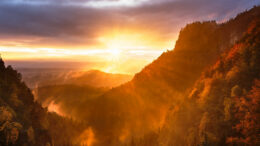This is going to be a good year — dare I say it, a great year — for environmental books. We’re just two months into 2023, and already dozens of fantastic volumes have landed on our review desks. There are books about wildlife, climate change, pollution, environmental justice, activism…you name it. The subjects and authors are as varied as the threats we all face.
So where to start? We’ve picked the best books we’ve read so far this year, pulling from titles published in January and February 2023. This is hardly an exhaustive list — reviewing them all would be a full-time job — but it encompasses the ones we felt would make the most impact on readers and, through them, the world.
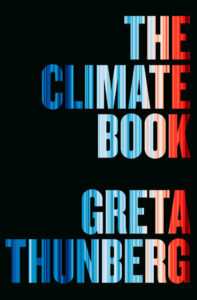 The Climate Book
The Climate Book
by Greta Thunberg
Our take: Subtitled “the facts and the solutions,” this book contains dozens of bite-sized yet thought-provoking essays from scientists, activists and other leaders outlying the history and reality of climate change, where we’re still going wrong, and what we need to do to fight it. Thunberg provides several insightful essays throughout the book, which is also packed with more graphs and charts than you can shake a hockey stick at. The result is one of the most authoritative yet accessible books about climate change I’ve ever seen. Even a person like myself, who’s been writing about climate change for decades (sigh), will find something new or noteworthy on every page. I know I’ll be referring to this book quite a bit in the months ahead.
From the publisher: “In The Climate Book, Greta Thunberg has gathered the wisdom of over one hundred experts — geophysicists, oceanographers and meteorologists; engineers, economists and mathematicians; historians, philosophers and Indigenous leaders — to equip us all with the knowledge we need to combat climate disaster. Throughout, illuminating and often shocking grayscale charts, graphs, diagrams, photographs and illustrations underscore their research and their arguments. Alongside them, she shares her own stories of demonstrating and uncovering greenwashing around the world, revealing how much we have been kept in the dark. This is one of our biggest challenges, she shows, but also our greatest source of hope. Once we are given the full picture, how can we not act? And if a schoolchild’s strike could ignite a global protest, what could we do collectively if we tried?”
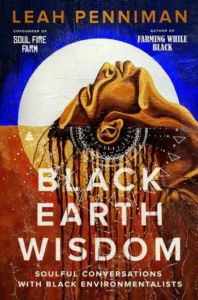 Black Earth Wisdom: Soulful Conversations With Black Environmentalists
Black Earth Wisdom: Soulful Conversations With Black Environmentalists
by Leah Penniman
Our take: Penniman, author of Farming While Black, describes this book as “a tapestry of voices.” Those voices certainly shine through this collection of roundtable interviews with scientists, authors, journalists and other experts. The resulting discussions range from spirituality to soil, and from environmental justice to defending communities. One of the most important themes that arises is the need to listen not just to ourselves but to the Earth. (Speaking of listening, I reviewed this in ebook format, but the pending audio book seems like a fertile avenue for conveying these ideas and conversations.)
From the publisher: “This thought-provoking anthology brings together today’s most respected and influential Black environmentalist voices — leaders who have cultivated the skill of listening to the Earth — to share the lessons they have learned. These varied and distinguished experts include Pulitzer Prize and National Book Award-winning author Alice Walker; the first Queen Mother and official spokesperson for the Gullah/Geechee Nation, Queen Quet; marine biologist, policy expert and founder and president of Ocean Collectiv, Dr. Ayana Elizabeth Johnson; and the executive director of the North Carolina Association of Black Lawyers, Land Loss Prevention Project, Savi Horne. In Black Earth Wisdom, they address the essential connection between nature and our survival and how runaway consumption and corporate insatiability are harming the earth and every facet of American society, engendering racial violence, food apartheid and climate injustice.” (Available Feb. 28)
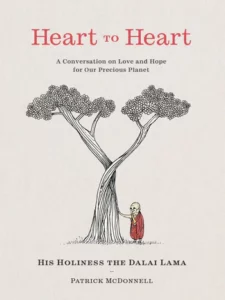 Heart to Heart: A Conversation on Love and Hope for Our Precious Planet
Heart to Heart: A Conversation on Love and Hope for Our Precious Planet
by the Dalai Lama and Patrick McDonnell
Our take: A religious leader and a cartoonist team up to produce a beautifully illustrated book that serves as a prayer for compassion for the planet.
If you’re familiar with the Dalai Lama’s work, you may not find much new in the text of this book, which draws from several of his previous writings. But McDonnell, the creator of the Mutts comic strip, ties it all together and takes it all to a new level through his watercolor illustrations of a panda seeking help for a planet in plight. The result is something akin to a graphic novel, wrapping up the poignancy of environmental destruction with the hope that we all can — and must — make a difference.
From the publisher: “At the Dalai Lama’s residence in Dharamsala, India, an unusual visitor has arrived. His Holiness interrupts his morning meditation to greet a troubled Giant Panda who has travelled many miles to see him. Welcoming him as a friend, His Holiness invites the Panda on a walk through a cedar forest. There in the shadow of the Himalayas, surrounded by beauty, they discuss matters great and small…”
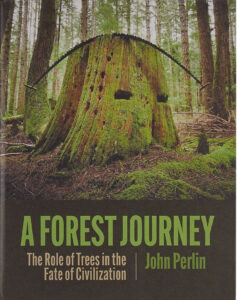 A Forest Journey: The Role of Trees in the Fate of Civilization
A Forest Journey: The Role of Trees in the Fate of Civilization
by John Perlin
Our take: Third time’s the charm. This latest update to the classic book is ready to stand the test of time. There’s so much good material this time around they had to publish 70 pages of endnotes online. Meanwhile the 500-page physical book is packed with hundreds of gorgeous photos and illustrations that depict the history of trees on Earth and their uncertain future. You’ll savor (or worry) over every detail.
From the publisher: “Originally published in 1986 and updated in 2005, A Forest Journey’s comprehensive coverage of the major role forests have played in human life — told with grace, fluency, imagination, and humor — gained it recognition as a Harvard Classic in Science and World History and as one of Harvard’s “One Hundred Great Books.” This is a foundational conservation story that should not be lost in the archives. This updated and expanded edition emphasizes the importance of forests in the fight against climate chaos and the urgency to protect what remains of the great trees and forests of the world.”
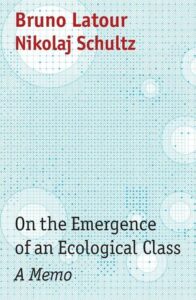 On the Emergence of an Ecological Class: A Memo
On the Emergence of an Ecological Class: A Memo
by Bruno Latour and Nikolaj Schultz, translated by Julie Rose
Our take: This short book contains just 76 paragraphs, but each one packs a punch. Written with style and wit and structured in a way as a business memo — or perhaps more accurately, a manifesto or strategy document — it provides a philosophical, class-based look at the ways an “ecological class” should demand change in what Latour and Schultz call the New Climate Regime.
Of course, even the authors have their doubts. “Never has the idea of an ‘ecological class that’s self-aware and proud’ seemed so remote,” they write in their postscript. But oddly enough, the war in Ukraine gives them hope. They write that the war is being fought on two fronts, one on Ukrainian soil and the other for the future of a carbon-free lifestyle.
From the publisher: “Under what conditions could ecology, instead of being one cluster of movements among others, organize politics around an agenda and a set of beliefs? Can ecology aspire to define the political horizon in the way that liberalism, socialism, conservatism and other political ideologies have done at various times and places? What can ecology learn from history about how new political movements emerge, and how they win the struggle for ideas long before they translate their ideas into parties and elections?”
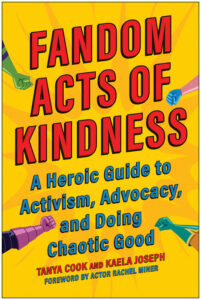 Fandom Acts of Kindness: A Heroic Guide to Activism, Advocacy and Doing Chaotic Good
Fandom Acts of Kindness: A Heroic Guide to Activism, Advocacy and Doing Chaotic Good
by Tanya Cook and Kaela Joseph
Our take: With great cosplay comes great responsibility.
Let’s be clear — this is not specifically an environmental book. But it is a look inside a new type of activism driven by pop culture and pure ideals, and it offers a great way to extend the environmental movement to people from other communities who already have their own organizational structures, history of collaborations, and desire to generate positive action for the world.
In other words, environmental groups, rent a booth at your next local comic-con.
From the publisher: “Fandoms are united as a community because of the power of story. And it’s exactly the magical alchemy forged when mixing story and community that has helped fandoms across the world feed thousands of hungry children, donate countless books, build schools, register voters, disrupt online hate speech and save lives through crafting PPE for COVID-19 frontline workers, natural disaster response and mental health crisis support. Fandom Acts of Kindness not only tells the stories of the good fans have done in the world but serves as a dungeon master’s guide to how to be a hero yourself. Perfect for those who want to inspire others, organize collective action, sustain and nurture your own mental health and creativity, and do it all through a pop culture perspective.”
 Wolfish: Wolf, Self, and the Stories We Tell About Fear
Wolfish: Wolf, Self, and the Stories We Tell About Fear
by Erica Berry
Our take: I’ll admit I felt a bit apprehensive going into this one. The title seemed to paint wolves as villains and play off the negative public perception that too often drives them to their deaths.
But maybe that worry proves the book’s point. Wolfish is less a profile of wolves than a meditation and memoir — an examination of the nature of fear and the fear of vanishing nature. Through a creative, feminist lens, it uses wolves as the defining narrative and metaphor to provide insight into our relationship with the wild and with ourselves. The result is a work that feels very much of the moment.
From the publisher: “What do stories so long told about wolves tell us about our relationship to fear? How can our society peel back the layers of what scares us? By strategically unspooling the strands of our cultural constructions of predator and prey, and what it means to navigate a world in which we can be both, Erica bridges the gap between human fear and grief through the lens of a wrongfully misunderstood species.”
Conflict of Interest Department:
Biodiversity Litigation edited by Guillaume Futhazar, Sandrine Maljean-Dubois and Jona Razzaque — This textbook “presents the trends in biodiversity litigation, highlighting recent evolution, and measuring the influence of international biodiversity law.” It contains a chapter by one of the legal minds at our parent company, the Center for Biological Diversity.
Honorable Mentions:
Six more Jan./Feb. releases that caught our attention:
Oil Beach: How Toxic Infrastructure Threatens Life in the Ports of Los Angeles and Beyond by Christina Dunbar-Hester
Profit: An Environmental History by Mark Stoll
Koala: A Natural History and an Uncertain Future by Danielle Clode
The Darkness Manifesto: On Light Pollution, Night Ecology and the Ancient Rhythms that Sustain Life by Johan Eklöf
The Great Displacement: Climate Change and the Next American Migration by Jake Bittle
Tenacious Beasts: Wildlife Recoveries That Change How We Think about Animals by Christopher J. Preston
That’s it for this month. Check out the “Revelator Reads” archives for hundreds of other recent environmental books.
![]()


